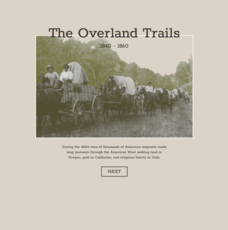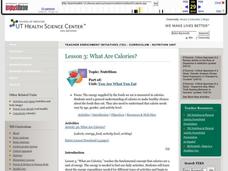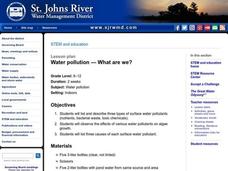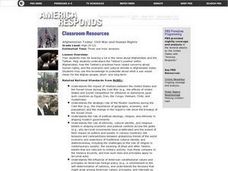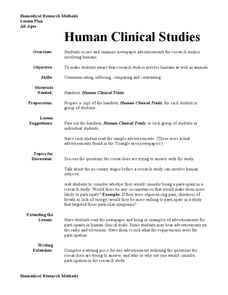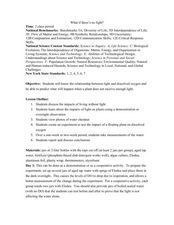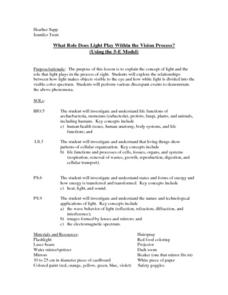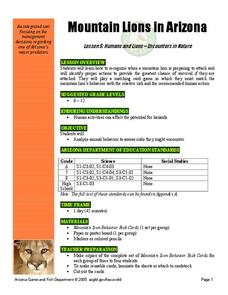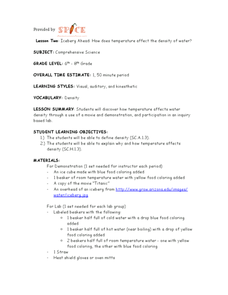Teach Engineering
Preconditioning Balloons: Viscoelastic Biomedical Experiments
What does stretching a balloon have to do with equilibrium? Groups explore preconditioning by stretching a balloon to a point of equilibrium. They then measure the amount of force required to stretch the balloon to the same point several...
Baylor College
What is Blood Pressure?
Find out how we describe the force created by the blood against the walls of the vessels in a heart-pumping lesson! As part of a unit on the heart and circulatory system, cardiology kids use a blood pressure monitor to find their...
Do2Learn
Social: Behavior
What does "good behavior" look like? Set clear guidelines for what type of behavior is expected in different situations, and ensure your learners understand the verbal cues that you provide.
University of Colorado
Is There Life on Earth?
To find life on another planet, scientists look for gases (atmosphere), water, and temperatures that are not extreme. For this activity, groups of pupils become "Titan-ians," scientists who want to explore Earth for possible life forms....
NASA
The Big Climate Change Experiment Lesson 1: Pre-Exploration
Most have heard of climate change, but what does it really mean? Scholars first answer a set of pre-assessment questions about climate change to help instructors gauge how much they know. They listen to a video lecture, watch a news...
Towson University
Looking Backwards, Looking Forward
How do scientists know what Earth's climate was like millions of years ago? Young environmental scholars discover how researchers used proxy data to determine the conditions present before written record. Grouped pupils gain experience...
University of Richmond
The Overland Trails 1840-1860
What led Americans to head west in the 1800s? Using an interactive map and journals from those who traveled, pupils explore the stories of those who migrated. In addition, they see how the numbers fluctuated in response to the push-pull...
Bully Free Systems
Bully Free Lesson Plans—Fifth Grade
Two lessons take a look at bullying. Lesson one focuses on physical bullying. Scholars identify the bullying type's qualities, read short stories and answer comprehension questions. Lesson two offers advise on what to do as a bystander...
Bully Free Systems
Bully Free Lesson Plans—Sixth Grade
Two lessons stress the importance of keeping your classroom bully-free. Discussion, collaborative work, role-play, and writing allows participants to examine whether their classroom is welcoming to new members and decide what they should...
Curated OER
What Are Calories?
Students examine calories for the human body. In this calorie lesson, students explore the energy expenditures needed for different types of activities and how many calories are needed to support daily functions.
Curated OER
Early Humans
Sixth graders read about the different types of Humanoid. They examine the different cultural beliefs and their own personal beliefs about evolution. They research the species using the scientific theory about evolution.
Curated OER
What Are We?
Learners list and describe three types of surface water pollutants. They observe the effects of various water pollutants on algae growth. Three causes of each surface water pollutant is listed.
Curated OER
Afghanistan Today: Civil War and Human Rights
High schoolers examine the relationship between the United States and the Soviet Union during the Cold War. They analyze the role of religion and cultural identity in shaping governments. They also examine the United States foreign...
Curated OER
I Know What I Am... but, What Are You? (Classifying Living Things)
Learners examine how to classify living things by effects, environment, and activity. They explore various websites, develop a list of facts they learn about classifications, and participate in a distance online learning session with the...
Curated OER
Civil Rights - What are yours?
Students explore US Civil Rights. In this us government lesson, students watch a video and then complete a worksheet on identifying and understanding their personal civil rights.
Curated OER
Human Clinical Studies
A simple, yet poignant lesson gets teens reading ads for clinical trials and discussing the requirements for participation. At home, they peruse the newspaper to find current examples of similar advertisements. The purpose of this lesson...
Curated OER
What Parts of a Plant Do We Eat?
Did you know that tomtoes and cucumbers are actually fruits? Biology or botany beginners read about the function of flowers and fruit and find that some food items commonly called vegetables are, by definition, also fruits! Give learners...
Curated OER
What If There's No Light?
students discuss the importance of light and the consequences of living without it. Using a plant as a demonstration, students predict and observe what happens to a plant when it does not receive enough light. In groups, they experiment...
Curated OER
I Wonder What a Pest Is...
Students observe what animals are considered to be pests and why. They conduct a mock trial of a honeybee arguing if it is a pest or not. They determine pros and cons of honeybees to prepare for the trial.
Curated OER
What Role Does Light Play Within the Vision Process?
Pupils are introduced to the relationship between light and vision. In groups, they participate in experiments to discover how different wavelengths are divided in the visible spectrum. They record their answers and discuss their...
Curated OER
Mountain Lions in Arizona Lesson 5: Humans and Lions - Encounters in Nature
Fledgling felinologists are taught how to recognize when a mountain lion is preparing to attack. They identify proper actions to provide the greatest chance of survival if they are attacked. Learners play a matching card game in which...
Curated OER
What's Geography?
While not a comprehensive look at the study of geography, this resource could be used as an introduction to the topic. A teacher could add examples and other information to augment this presentation.
Curated OER
Iceberg Ahead: How Does Temperature Affect the Density of Water?
Demonstrate how ice floats on water and get the class thinking about why icebergs are so deceiving. Investigators then experiment with mixing water of the same temperature and water of different temperatures. Make sure to explain the...
Curated OER
Human Impact Starts with?
What kind of effects do humans have on their environment? Review key anthropogenic vocabulary with a fill-in-the-blank handout. You may wish to use this as an ongoing glossary, review before a test, or even create a crossword puzzle or...






